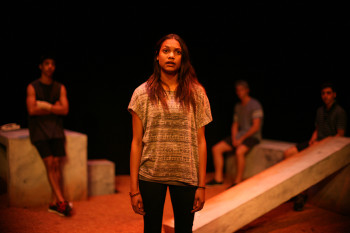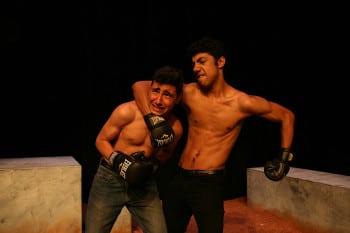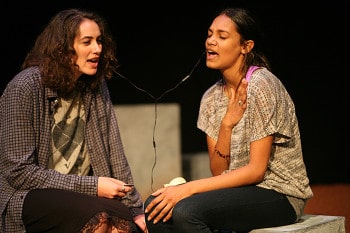Review: Sugarland – ATYP
Sugarland, written by Rachel Coopes and Wayne Blair, born out of multiple residencies in the remote Northern Territory town of Katherine, is an exercise in capturing what life is like for young people in the area. It is a beautifully-calibrated play, pitched perfectly to the adolescent ear and with a compassion for its characters that transcends the alliance of similar ages – this is a play for young people, but it’s an important play for everyone.
Nina (Dubs Yunupingu) needs a new house. She’s been staying with family but it’s not working out. It’s not working out to such an extent that she has a mass of stitches on the back of her head from a thrown brick that she didn’t quite duck. Bureaucracy makes this hunt for safe shelter next to impossible — because she has a roof over her head she can’t be considered legally homeless. But Nina is a great singer, and there’s a Sing Search competition no one can stop talking about, and if she wins — and she’ll probably win — with the prize money she’ll have the bond and the first lot of rent for a place of her own. So at least there’s that.

Music is the thread that brings Nina and Erica (Elena Foreman) together. A recent Katherine transplant thanks to a RAAF father, Erica has lived in Melbourne and Canberra before landing in the NT, and she is hard and hurting and alienated from her lonely life in a way that her new friends don’t get at all. But she can share fries and iPod earbuds with Nina, and tease Aaron (Narek Arman) and Charles (Michael Cameron) and it’s a connection that matters and counts, at least for a minute or two, every so often.
And then there’s Jimmy (Hunter Page-Lochard). Nina’s cousin — though “not the way your mob means it”, Nina says to Erica — who could enter Sing Search with his band too, except he isn’t meeting the attendance requirements at school for it. He has other things on his mind, like hanging out and smoking and also his father is dying and he can’t pay for his truancy fines and his uncle might kill him. The shame and conflict and pain sits in him unstably, violently, and when he does lash out at Aaron, an Iraqi refugee that’s like everyone’s fun and funny little brother, you feel the weight of systemic injustice and the hopelessness of individual action in a world that allows no space, sometimes, for positive change.
The play is excellent and the dialogue is authentic and the structure is strong, and well-paced, and immersive. The cast is strong, very strong, and so much of it rests on the shoulders of Yunupingu, whose wry and quick-witted Nina is our centre in this story, grave and a beautiful singer and small and impossibly contained, and on her counterpart Jimmy. Page-Lochard coils anger and helplessness into his muscles and moves and paces as though caged; Nina shrinks and he expands, not fitting anywhere.
David Page and Fraser Corfield are the perfect co-directors for this piece. Page brings a lyrical sense of story to the production, turning his ear towards the music of the lines; conversation flows like a river and the scenes transition with the ease of his Bangarra-honed eye. Corfield has an extraordinary sensitivity for youth work, which is why atyp is such a great fit for him in general, but here he straddles with ease of presenting adolescent problems with the very adult and validating gravitas they deserve. Assisted with Jacob Nash’s bare-earth-and-pillars set, which is everywhere and nowhere all at once, and Juz McGuire’s lighting, flashing red with pain and slowing into shadows for contemplation, this is a lovingly-stitched quilt of growing up in a broken world but being so, so determined to be whole.

Woven throughout the school day, the hangouts near the river, the self-harm/self-medicating of booze and smokes and choking, is a story Nina tells us about this boy. The boy who is a good hunter, the boy who notices the river is brown and not happy, the boy who knows it needs to be fixed, because one river is all rivers. He follows along to a riverbank. A town on one side, an Aboriginal community on the other. The two sides of our country and culture, the contradiction of Katherine. But neither space is equipped to help.
“How are we gonna fix it?” he asks, Nina asks, looking at us, small and steely, taking drastic measures because it’s the only way she could get a place to live. ‘How are we gonna fix Country?”




